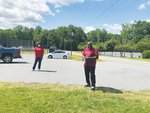



SILER CITY — The coronavirus pandemic introduced many challenges for all Chathamites. Perhaps none were more affected than the county’s homeless population, though.
Nationwide, as disease spread and states shut down, a second pandemic emerged from the economic fallout: a debilitating cycle of homelessness from which many cannot recover.
“Unfortunately, being homeless comes with many barriers,” said Jane Wrenn, director of The Salvation Army of Chatham County. “Some include past evictions, personal financial crisis, poor physical health, alcohol and substance abuse, mental health issues, the experience of the criminal justice system, just to name a few. In my opinion breaking out of homelessness is a lifetime challenge but can be broken by reducing these barriers.”
COVID-19 exacerbated those issues. For those already homeless at the pandemic’s start, extenuating circumstances such as rising unemployment made breaking the cycle nearly impossible. For others — already teetering between housing security, mental stability and emotional health — unwelcome isolation from statewide lockdown pushed them beyond their limits.
But the problem existed long before COVID-19 arrived in the U.S. At the start of 2019, 568,000 people were known to be homeless across the country, according to the most recently available data from the U.S. Dept. of Housing and Urban Development — about 15,000 more than in the year before.
That’s 17 in 10,000 Americans, and the numbers likely under represent the problem’s breadth.
“The homelessness population in Chatham is a challenge,” said Wrenn, whose organization is one of the county’s leading philanthropic groups working to combat Chatham’s homelessness. “...The number of true homelessness is hard to estimate due to the fact that some might be staying with friends or family, sharing a place, living in hotels and other alternative scenarios. Homelessness shows in many options, not just people living on the streets.”
In Chatham, the issue is most concentrated in western towns, especially Siler City. Like Wrenn, town leaders say it’s difficult to estimate the size of Siler City’s homeless population.
“But I think last time we talked about it, we identified 16 more people that had actually would meet the definition of being homeless,” said Mike Wagner, Siler City’s chief of police.
That “definition” is more complicated than just lacking a home, Wagner says. Homelessness is born of many circumstances, all of which make a solution hard to identify.
“There’s so many underlying factors,” he said. “Displacement, dependency, mental health — sometimes both are co-occurring with a person that becomes homeless.”
The police and other agencies such as the Chatham County Dept. of Social Services sometimes coordinate to assist homeless individuals with short-term arrangements to get them back on their feet. But often, Wagner says, it’s not enough.
“Even when the assistance is given ... and once the relief is stabilized, there’s an action plan about that person — that you need to take these action steps to get yourself stabilized,” he said. “And sometimes, they don’t do that, and they find themselves back at square one.”
To more completely address the problem, then, requires the dedicated efforts of private organizations.
“I would say that what we have done, and the way that the town has contributed,” said Siler City Town Manager Roy Lynch, “has been through the nonprofits as far as helping to fund some of those who do provide the direct resources that we cannot.”
Such groups include Wrenn’s Salvation Army, the Central Piedmont Community Action Group and representatives from Central Carolina Community College. Community 1 Solutions, a non-profit led by True Community Church Pastor Cecil Wilson, is especially active in assisting Siler City’s homeless population, according to Wagner and Town Planner Jack Meadows.
“His group helps all folks in need,” Meadows said, “whether with housing issues or food and other things.”
Wilson did not respond to multiple requests for comment, but at the Salvation Army, Wrenn and her team are working hard to expand their programs to address the homelessness crisis before it spirals out of control.
“We will soon begin a Rapid Rehousing Pilot program for Chatham County,” she said. “Unfortunately, housing is an issue, or I should say, the lack of housing in Chatham County is a barrier. We have formed relationships with landlords and apartment managers that we hope to increase those partnerships and to strengthen those that we have.”
But, she says, providing houses will not alone eliminate homelessness.
“Each situation is unique to that family or individual; we work to help those that need help with their unique barriers,” she said. “We have many resources that we work with to provide the homeless the best possible help they might need. We offer direct resources or reach out to our partnerships.”
Despite such efforts, though, homelessness in Chatham and around the country is almost certain to worsen before it improves. While pandemic circumstances have cast many to the precipice of homelessness, some have avoided the final plunge as beneficiaries of the statewide evictions moratorium, which is scheduled to expire at the end of March if Gov. Roy Cooper does not extend it.
When it finally expires, some will likely have to leave their homes.
Still, Wrenn is confident Chathamites will rally to support their disadvantaged neighbors.
“The community has always come to support The Salvation Army in Chatham,” she said, and she doesn’t expect that to change.
Besides monetary donations, people can donate several high-demand items such as socks, combs, pencil and notepad, toiletry items such as deodorant, shampoos, soaps, hand sanitizer, and face and hand wipes, Wrenn said.
“Once a family or individual is in housing, many items might be needed,” she added. “One success story was we had many people come together and furnish almost the entire house for this homeless couple that had absolutely nothing to start with.”
For any experiencing homelessness, or for those who would like to learn more about assisting Chatham efforts to end homelessness, Wrenn welcomes calls to The Salvation Army at 919-542-1593. Donations can be mailed to The Salvation Army, P.O. Box 752, Pittsboro, NC 27312.
If your circumstances are dire, town staff recommend calling 211.
“It’s like a central hub,” Meadows said. “And that’s where they want folks to call who have needs, who need help. Dial 211 first, and then that organization routes you to say the Salvation Army, or Central Piedmont.”
Much like 911, 211 “provides individuals and families in need with a shortcut through what can be a bewildering maze of health and human service agency phone numbers,” according to the Federal Communications Commission. “By simply dialing 211, those in need of assistance can be referred, and sometimes connected, to appropriate agencies and community organizations.”
Reporter D. Lars Dolder can be reached at dldolder@chathamnr.com and on Twitter @dldolder.